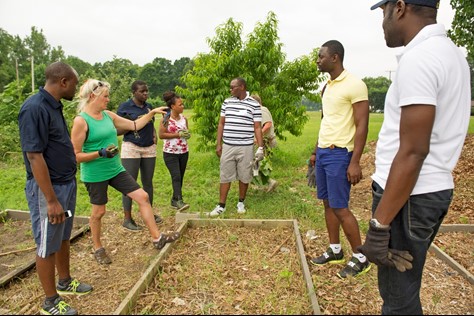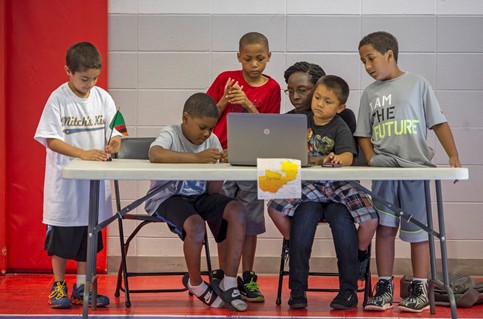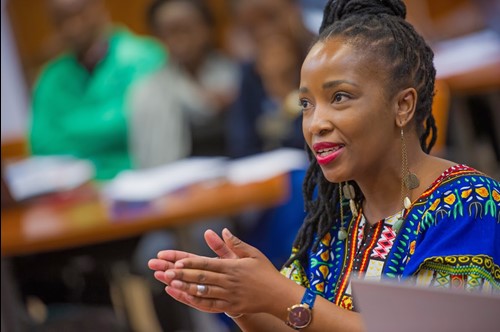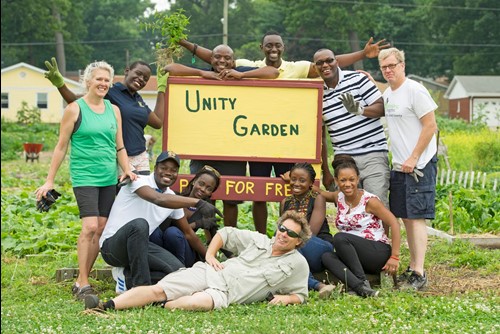YALI!
By | Fall 2014

Takunda Chingonzo was wearing a shirt with an ND logo as he stood in line at the Indianapolis Black Expo in July. You might guess what happens next: The guy in front of him is a Domer and strikes up a conversation. Chingonzo tells the alum he’s from Zimbabwe on his first trip to the U.S. That he’s studying at Mendoza for six weeks through the Young Africa Leaders Initiative (YALI) Mandela Washington Fellows program. That he’s an entrepreneur with two successful technology startups under his belt and one in development. And that he’s 21 and still in college.
Intrigued, the alum invites him to dinner. A few hours later, Chingonzo has an investor for his startup, Saisai, and another connection to the Notre Dame network.
If Chingonzo has an uncanny energy that attracts unexpected opportunities, the YALI program was the right place at the right time. Less than a month after meeting the alum in Indianapolis, Chingonzo was the YALI participant chosen out of 500 to interview President Barack Obama in Washington, D.C. In front of leaders from 50 African countries at the U.S.-Africa Leaders Summit, Chingonzo respectfully but firmly questioned Obama about targeted sanctions against Zimbabwe that are unintentionally hurting entrepreneurs there.
In the end, Obama promised to address the matter and even gave Chingonzo a plug: “If any of you are interested in investing in this young man, let him know,” the president said before hugging Chingonzo.
Of course, investing in Chingonzo, in YALI and, ultimately, in Africa makes tremendous sense. As Africa expands on a global economic stage, much is at stake regarding health, human rights, security and other areas. In particular, the need for business leadership and entrepreneurship training is paramount, especially on a continent where 60 percent of the population is under 35.
YALI, a signature program launched this year, seeks to strengthen young leaders as they address these issues in sub-Saharan Africa.

The fellowship enlists top U.S. educational institutions, including the University of Notre Dame, to provide immersive training in business and entrepreneurship, civic engagement and public administration to 500 fellows. This year’s program ran from June 16 to July 25, after which participants attended the summit in Washington.
The 500 fellows, selected from 50,000 applicants nationwide, wielded significant experience: 75 percent hold an executive or mid-level position; 39 percent operate their own business; 48 percent have graduate degrees; and 25 percent work for a nongovernmental organization, according to a White House fact sheet.
Entrepreneurship is critically important on a continent where 72 percent of young people make less than $2 a day according to the Rockefeller Foundation. Without new startups, there simply isn’t enough existing commerce to provide jobs to a vast population suffering food scarcity and dire poverty. In an interview with National Public Radio, Notre Dame fellow Enitan Kuku of Nigeria explained the desperation or employment she sees every day.

“On Third Mainland Bridge, driving in the rain, I see people offering to sell me gala—[which are] like, sausage rolls—on the street of Lagos,” she says in the interview. “It’s raining. The bridge is like 30 minutes long by driving … and you see these guys walking from the edge of the bridge to the other in the rain, in the sun. Sometimes I feel like crying because I say how do these guys survive every day? There is hunger in people to actually earn a living. They don’t have a job. So we just have to structure the old business model around entrepreneurship to say that is the next future for Africa.”
A part-time entrepreneur, Kuku holds a full-time job as a finance coordinator for British American Tobacco Nigeria. In her free time, she runs a business that helps young artisans from rural areas sell their work. She and the other 24 fellows from 17 countries see entrepreneurship, not industrialization or big business, as the key to transforming Africa.
With this in mind, the YALI fellows dove into lessons about business and entrepreneurship from Mendoza business professors and industry experts, exploring such topics as developing leadership skills for social change, funding new ventures, understanding markets, nonprofit management and dealing with corruption. They tasted life off campus through field trips to businesses in South Bend, Indianapolis and Chicago and community service projects on weekends.
Marc Hardy, director of nonprofit executive programs at Mendoza, organized Mendoza’s program. “In reviewing applications, I noticed two recurring concerns: unemployment/underemployment and corruption,” Hardy says. “These problems are leading young Africans to create their own businesses. Our fellows believe in Africa and they believe the way to raise the standard of living is through business and entrepreneurship.”
With YALI training up to 4,500 fellows during its 5-year lifespan (the number of participants is increasing to 1,000 in 2016. the potential for a multiplication effect across Africa is great, Hardy adds. “I think they are going to be the generation that ignites change for Africa,” he says. “Our fellows went from thinking they could make a difference to thinking they could
inspire a generation. To be clear, this program was not about them getting a job, it’s about these young leaders creating opportunities for others.”
Bill Brennan, senior associate for Mendoza, mentored the fellows individually. “I saw a common theme of Ask More of Business™ with them,” he says, mentioning the Mendoza tagline. “Many of them started businesses to tackle education, health care and other issues that are important to developing their countries,” he says. “Their vision was powerful and it was touching to be around them. You want to root for them and help them succeed.”
Especially when their business efforts are going to improve their communities, as is the case with Chingonzo and his current startup. Saisai, which means “wave” or “signal” in Zimbabwe’s Shona language, will offer free Internet access to people riding commuter buses in the country’s busiest cities. “Zimbabwe has one of the highest mobile data charges in the world,” he explains.

“That’s the reason why most of your medium- to low-income earning people cannot access the Internet and participate fully in their communities or the world. Saisai will make this technology accessible to everyone and revolutionize and liberate Zimbabwe.”
His time at Mendoza and connections he’s made have inspired other ideas, and he has immediate plans to partner with ND students to create intercontinental startups. And he wants to return someday for a master’s. “The Mendoza professors taught me how to create a more sustainable business,” he says. “I’ve gotten a better understanding of how the funding ecosystem for startups actually works. I now understand the role of the venture capitalist function and other important concepts. It’s information I would not have been able to learn if I had not come here. I find the environment and atmosphere here to be very conducive and the material and professors to be very insightful.”
Like Chingozo, Candice Potgieter of South Africa also discovered unexpected
connections through YALI. She was especially surprised at a field trip to Amish country in Shipshewana, Ind., where the fellows wandered through quilt shops and open food markets, getting a glimpse of their simple lifestyle.
“It’s nice to be immersed in this culture,” she said. “Places like this really help you see similarities from country to country—that we’re all humans and that there’s a shared humanity among us.”
These observations certainly reflect Potgieter’s mission as CEO of the KZN Science Centre in KwaZulu-Natal, South Africa—to respect, not diminish, the lives of children who mostly live in rural areas by enriching their lives through science.
“Science should not only be for those who can afford it, it needs to be for everyone,” she says. “Providing access to a science lab is a way of saying, ‘You can be who you want to be.’”
Potgieter, a 30-year-old astrophysicist, is wholly invested in this idea. She took the top post at the museum in 2012 while it was undergoing a name change, a funding crisis and a major reorganization. Not only did she stabilize the museum, which serves 180,000 visitors each year, but she also implemented new initiatives: mobile laboratories that bring science to rural areas; a program that introduces science to children ages 2-5; and a program that provides science equipment at low cost to schools, many of which have no equipment of any kind.
After six weeks at Mendoza, she couldn’t wait to get back home to implement the ideas she learned.
“[YALI] allows you to take a step back and look at improving your organization,” she says. “For our science center, we need to look at our funding models to see how to improve them. That’s how nonprofit organizations can end up being sustainable, and how we can introduce our model to other African countries. The professors at Mendoza have given me great ideas to explore when I return home. They were really interested in my organization and improving it.”
Beyond strategies for her own organization, YALI helped Potgieter form connections with colleagues from other African countries that have illuminated possibilities on a continental scale.
“These relationships and networks are incredible,” she says. “Specifically, I plan to go forward with our science center model to introduce to other countries. But in general, we
share a vision to improve lives in Africa, and the YALI program will help us move forward.”
---
Learn more about the YALI Mandela Washington Fellows program:
NPR Story: U.S. Program Helps Africans Learn Entrepreneurial Skills: http://n.pr/1xuq7kQ
Voice of America video profile of Mildred Apenyo: http://www.voanews.com/media/video/1966934.html
Young African Leaders Initiative Website: https://youngafricanleaders.state.gov/washington-fellowship/
Notre Dame YALI Website: https://yali.nd.edu

Comments